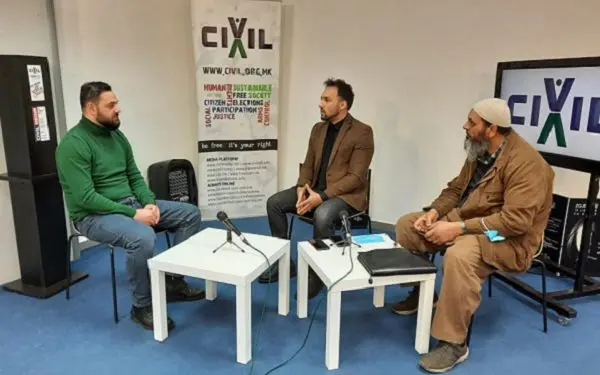In the religious building “Ihlas” in Zlokukjani, the Municipality of Karpos, there are no Wahhabists or radical activities that are contrary to the Islamic teaching, but rather believers who belong to the “Hanafi Mezheb”. For performing its religious rites, it has an official license and approval from the Mufti of the Islamic Religious Community – Skopje issued on 06.06.2016 based on Article 32 of the Constitution of the Mufti of the Islamic Religious Community – Skopje, say the boards of the mosque, after certain media published information that a Wahhabi mosque is illegally being built in Zlokukjani.
Bajram Isenovski, from the mosque board, did not want to talk in front of CIVIL’s camera, as these days, representatives of the Islamic Religious Community are to meet with representatives of the Municipality of Karpos to look at matters related to the mosque in Zlokukjani.
Activist Tefik Mahmut says that they have met with the legal team for urban affairs in the Municipality of Kapos and that there is no formal-legal decision for tearing down the mosque, as it was reported in the media that it was to be demolished in 15 days.
“Our country is a multi-religious country, where the highest legal act guarantees us the right for us to foster and proclaim cultural and religious values in this country regardless of our ethnic affiliation, regardless of whether it concerns a minaret or a church bell, if we already have such initiatives, they cannot and must not apply only to the Roma. The same neighborhood also has a church, but the urban planning team of the Municipality of Karpos did not go there. Why is that so? That is why just the Roma poor communities together with the religious buildings cannot be a thorn in the eye of the Macedonian public”, he says.
Mahmut says he strongly believes that a common language will be found between the Islamic Religious Community and the municipal authorities so that the building is not torn down.
“However, if the competent authorities decide on unequal treatment, we announce that the Roma community in Zlokukjani, Topana, Gjorce and Suto Orizari, but also other communities, will organize protests for unequal treatment and discrimination based on ethnic and religious affiliation. Complaints to national and international bodies that work in the area of monitoring and exercising human rights. I honestly hope and strongly believe that the highest legal act in the state will also apply to the Roma Muslims in our country”, he says.
Mahmut, who at the last local elections was a candidate of Levica in the race for mayor of the Municipality of Suto Orizari, denies being politically involved in this initiative.
“I am not a member, nor have ever been a member of the Levica political party and categorically claim that this initiative is original and organized by the Roma themselves and has no political elements, has no political figures involves in our initiatives. I am involved in this initiative to offer legal assistance and activism is something I have being doing my whole life. I hope that the Mayor (Stevco Jakimovski) and the competent bodies will have concernfor the Roma (religious) building and will not see this from a xenophobic perspective, but from an interethnic, intercultural and multi-religious perspective. We hope that we will meet bridges instead of walls between different ethnic and religious groups”, says Mahmut.
He stressed that equality and justice, respect for the rights of minorities, together with the smaller communities in the country, should be the parameters that will guide us to our collective goal – European integration of our country.
“I say our country because the Republic of North Macedonia is also a country of the Roma and we are equal citizens and that means that whether they like it or not, if they don’t like us – they have to respect us according to the legal regulations”, outlines Mahmut.
The Mayor of Karpos, Stevco Jakimovski, did not answer our phone calls and SMS messages for him to give us a statement in relation to the religious building in Zlokukjani.
Neither did the Islamic Religious Community until the publication of this text.
Dehran Muratov
camera and editing: Arian Mehmeti
Translation: N. Cvetkovska
















